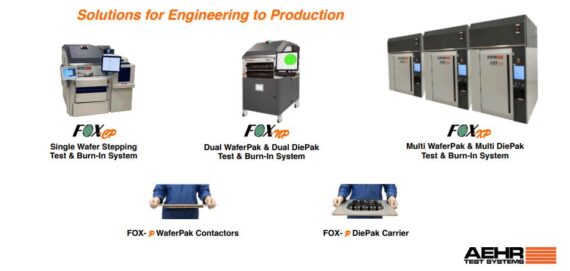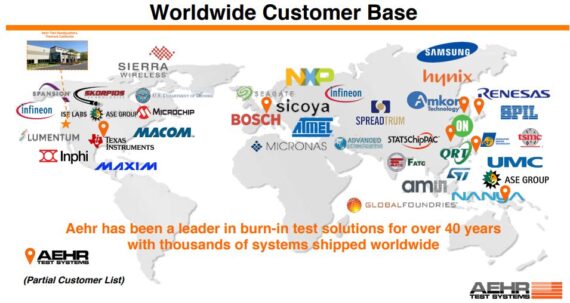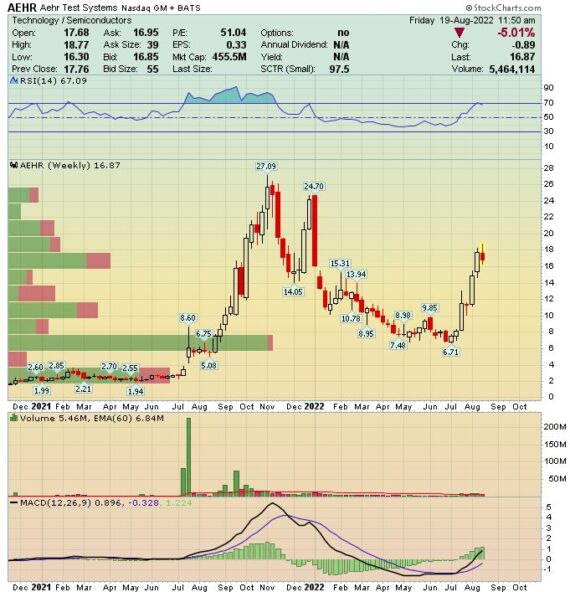Aehr Test Systems (AEHR) – Crazy for Carbide
Yesterday in the JaguarWebinar, a client asked about shares of Aehr Test Systems (AEHR). Unfortunately, this is a stock that we have not covered so we needed additional time to pull research. As far as what the company does, they develop, manufacture, and sell solutions designed to reduce the cost of testing and to perform reliability screening and stress testing of memory semiconductor integrated circuits, sensors, and optical devices. As the company states in their 10-K filing, “The expanding automotive, mobility, networking, and telecommunications markets require semiconductor devices that meet increased quality and reliability specifications. To meet these needs, device manufacturers are increasing capacity and performing additional testing and burn-in of their products, creating opportunities for Aehr Test products in package and wafer-level testing.”
The company, over the years, has developed and introduced several product families, including the ABTSTM and FOXTM family of systems, the WaferPakTM Contactor and the DiePak® Carrier for making electrical and thermal contact with devices under test, and WaferPak Aligners and DiePak Autoloaders for handling and alignment of devices into the corresponding WaferPaks and DiePaks.

These solutions help address multiple test and burn-in segments including silicon carbide devices for electric vehicles, silicon photonics markets that include data center infrastructure and worldwide 5G infrastructure, 2D/3D sensor markets related to consumer electronics and automotive applications, and the data storage and memory markets
In terms of customers, it should be noted that according to their 10-K filing, during fiscal 2021, Advanced Semiconductor Engineering, ON Semiconductor Korea, Intel, and Inphi, accounted for approximately 24%, 23%, 20% and 10%, respectively, of the company’s net sales.

Earnings
Last month, the company reported its Q4 earnings in which Net Sales came in at $20.3M, an increase of 33% Q/Q and 166% Y/Y. Bookings came in at $4.4M. Turning to their outlook, for fiscal 2023 year ending May 31st, 2023, they expect full year total revenue to be at least $60M to $70M, with a strong profit margin similar to last year. They also expect bookings to grow faster than revenues in fiscal 2023 as the ramp in demand for silicon carbide and electric vehicles increases exponentially throughout the decade.
Speaking of silicon carbide (SiC), its been a very busy week of headlines and commentary surrounding this theme:
• On Sunday, August 14th, Stifel was out with a note raising their price target on ON Semiconductor (ON) to $68 following the company’s Silicon Carbide Investor Event. During that event, the company announced that silicon carbide capacity will be raised to 5x Y/Y output (from currently 3x Y/Y output) by the end of CY22E.
• On Monday, August 15th, Navitas Semiconductor (NVTS), the industry leader in gallium nitride (GaN) power ICs, announced the acquisition of GeneSiC Semiconductor, a silicon carbide pioneer with deep expertise in SiC power device design and process. The company said the transaction will be immediately accretive as GeneSiC is highly profitable, with more than 25% EBITDA margins. Calendar 2022 revenues are expected to be approximately $25M with demonstrated annual growth rates of over 60%.
• Finally, on Wednesday, August 17th, Wolfspeed (WOLF) reported quarterly earnings and highlighted their brand new Mohawk Valley fab, which is the world’s first fully automated 200-millimeter silicon carbide fab. “Since the opening, we’ve continued to run initial lots through the fab and remain on track to complete initial qualifications and ship products by the end of this fiscal year. We’ve also had several large customers visit the site prior to signing agreements with us, which is translating into stronger demand than we originally anticipated. The opportunity pipeline for silicon carbide has more than doubled to $35 billion in a single year.”
Back to AEHR, CEO Gayn Erickson on the conference call would start by saying that the strong revenue growth thus far in fiscal 2022 has been driven by the demand for their wafer level test and burn-in solutions, particularly for wafer level stress and stabilization of silicon carbide devices for use directly in the EV market. “The silicon carbide market for electric vehicles and its supporting infrastructure requirements are growing at a tremendous rate with Canaccord Genuity estimating that wafer capacity will increase from 150,000, 6-inch wafers in 2020 to 2021 to over 4 million 6 inch equivalent wafers in 2030 just to meet the electric vehicle market alone.”
The company’s lead customer for silicon carbide wafer level burn-in made significant investments in their silicon carbide production throughout this past fiscal year. They were excited to announce that they received $12.8M in new orders from them for multiple FOX-XP systems. All of this is expected to ship by the end of their fiscal third quarter ending February of 2023. “This adds to the backlog of systems that we’re shipping to them this fiscal year or fiscal quarter actually. In addition to the system capacity order, we expect significant subsequent orders for wafer packs needed for the system orders announced today, and they will ship at approximately the same time as the systems.”
Mr. Erickson would go on to discuss silicon carbide-based devices such as MOSFETs, or Metal Oxide Semiconductor Field Effect Transistors. These are extremely efficient, rugged, and reliable semiconductors that are used in the power conversion to charge the batteries and battery electric vehicles and then the engine controller traction inverters that drive the electric engines in EVs. This translates into a higher driving range on a single charge smaller battery sizes for traction inverters and faster charging time for onboard chargers. One of the biggest concerns of existing and would be electric car buyers is range anxiety, the fear of running out of energy before making it to a charging station.
“We are currently engaged in discussions with most other current and future silicon carbide suppliers. The major silicon carbide companies expect that most EV traction inverters will move to multi-chip modules. As such they have told us that they must move to wafer level stress and burn-in to remove the extrinsic failures before they put these known good die into multi-die modules to meet their cost, yield and reliability goals of these modules.”
Management would add that their benchmarks and evaluations with prospective new silicon carbide customers continue with very good momentum. These customers have told them that the FOX platform is the only solution that can scale to meet the production capacity needed to address the silicon carbide device growth, particularly for electric vehicle applications. This is an addition to a previously announced engagement with another large silicon carbide supplier, with whom they’ve been working closely with over the last year to correlate and qualify the FOX system to displace their current production reliability screening test and burn-in systems.
“As a result of all these positive evaluations, we believe that we will receive orders from at least several new silicon carbide customers and begin shipping systems to meet their production capacity by the end of our current fiscal year that ends May 31, 2023.”

